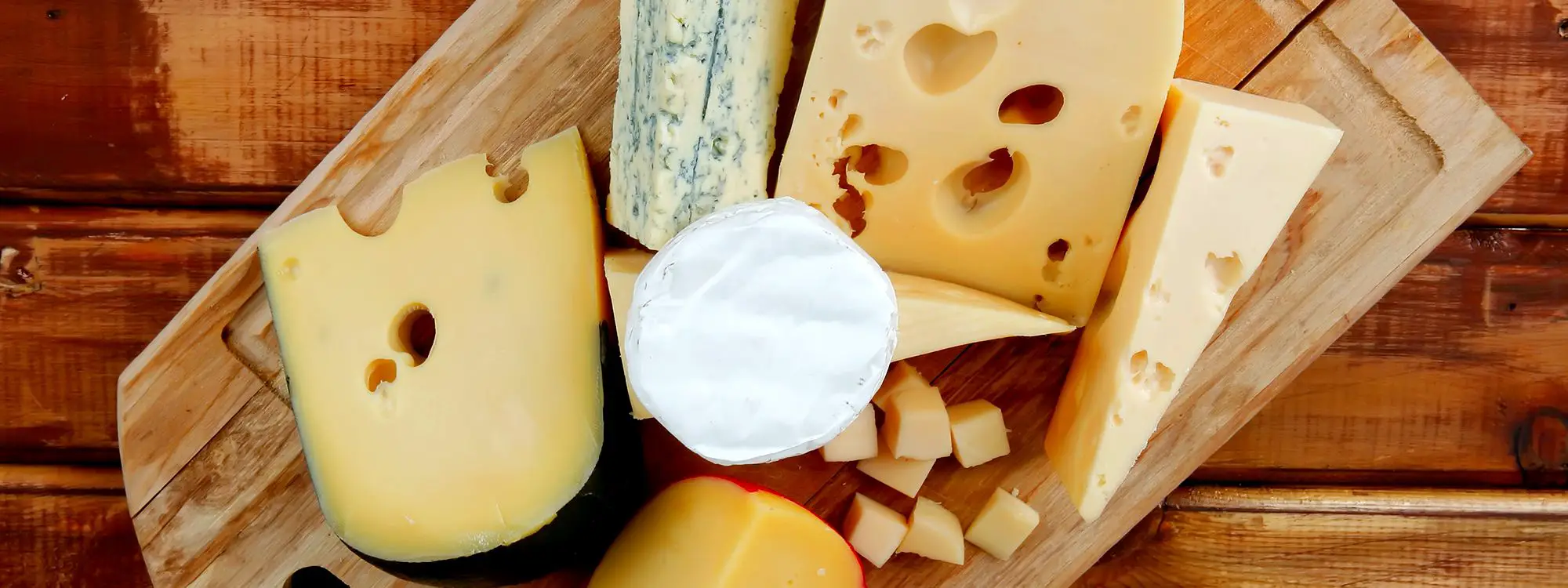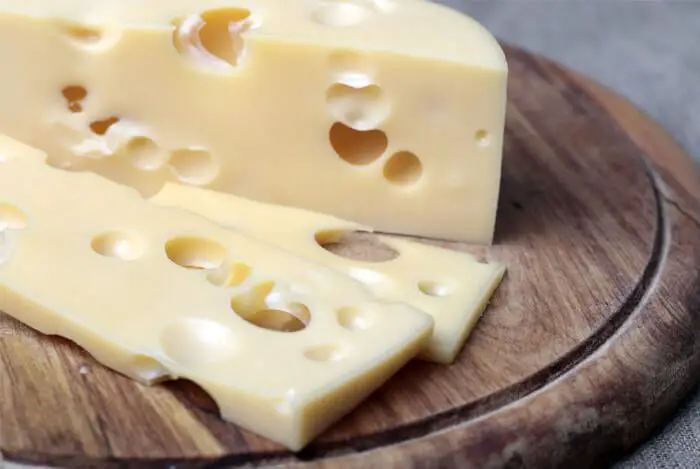Q Which Cheese Is Best For Losing Weight
A. Aside from its high protein content, cheese is also known to be high in fats too. However, all the cheeses listed here have an extremely low carb content, making it suitable for a low carb diet. Low carb diets are an especially effective method for weight loss as it causes your body to burn the stored fat for energy.
If you are looking to reduce your calorie intake even further, you can look for low fat or reduced fat dairy products. The fat content in these high protein cheeses will also keep you full for longer, curbing other snack cravings and keeping with a low carb diet!
Fact : There Is The Same Number Of Calories As Calories In Swiss Cheese
At first glance, you can see that in Swiss cheese is much the same number of calories as calories than in pepper jack cheese.
Swiss cheese has 393 kcal per 100g and pepper jack cheese kcal per 100g so it is pretty easy to calculate that the difference is about 0 %.
Additionally, it is also easy to notice that most of the calories in Swiss cheese cames from fat and in pepper jack cheese from carbs.
See tables below to compare Swiss cheese with pepper jack cheese in details.
How Many Carbs Are In Grated Cheddar Cheese
Shredded Cheddar CheeseNutrition
. Just so, does shredded Cheddar cheese have carbs?
A slice of cheddar contains 85 calories, 0.6 g of carbs, 5 g of protein, and 7 g of fat. Also worth noting: Many cheddars are mild tasting, and you may want more than one slice to feel satisfied. If opting for cheddar, go for sharp varieties for a bigger dose of flavor.
One may also ask, what is a serving size of shredded cheese? Its fairly easy to eyeball or measure out shredded cheese or ricotta, but a little more difficult to figure out what an ounce is when youre cutting a slice of cheese of the block. One ounce of cheese as about the size of a pair of dice, so one serving is about three to four dice.
Then, how many carbs are in grated cheese?
22 Calories
How many grams of fat are in shredded cheese?
228 calories. 19 grams of fat 12 grams of saturated fatCheese Comparisons.
Also Check: Where Can I Buy Wisconsin Brick Cheese
Medium Levels Of Cheese
A few cheeses weigh in at 100 to 125 mg: Neufchatel, Goat cheese, Gruyere. Consider that the varieties at the top of the list have nearly 4 times the amount of sodium than these cheeses! If you enjoy their flavors, these cheeses can probably considered as an occasional delicacy of a not too strict low sodium diet. Remember that Gruyère cheese is technically a variation of Swiss cheese.
The 15 Highest Protein Cheeses

10. Goat Cheese 1 ounce: 7 g Goat cheese comes from beneficial goat milk, which contains A2 casein protein and is therefore easier to digest 12) Cheddar Cheese: 24.9 g Protein Per 100 g. All cheese tastes delicious. However, Cheddar is one of the most famous varieties for a good reason. With a soft, creamy, and very flavorful taste, this cheese has fans from all around the world. Cheddar is also a high-protein cheese, with even a small 2-oz serving providing more than 14 grams Wild Game Venison, rabbit, squirrel 1 oz Pheasant, duck, goose 1 oz Cheese Any cottage cheese 1/4 cup Grated parmesan 2 tbsp Diet cheese# 1 oz Other 95% fat-free luncheon meat 1 oz Egg whites 3 Egg substitutes 1/4 cup Medium-Fat and Meat Substitute
Don’t Miss: How To Make Domino’s Philly Cheese Steak Pizza
Is Cheese High In Potassium Protein Phosphorus And More
Know someone who is looking for this info? Share it!
When you have kidney disease, dairy and cheese can seem pretty iffy. Isnt cheese high in potassium? Is there such thing as low potassium cheese?
What about phosphorus in cheese? And what about the protein? Is there protein in string cheese?
We will be covering all of that and more in this article!
How Many Net Carbs Are In A Slice Of Swiss Cheese
| Swiss Cheese Slices |
|---|
Similarly, it is asked, how many calories and carbs in Swiss cheese?
Nutrition Facts
| Protein | 7.5 g |
Also Know, is Swiss cheese healthy? And while that may be the case with some cheeses, Swiss cheese is known for being among the healthiest of cheeses. Swiss is lower in fat and sodium, making it an easy choice to fit into your healthful diet. Protein: Just one ounce of Swiss cheese packs a whopping 8 grams of protein.
Similarly, you may ask, does baby Swiss cheese have carbs?
Explore deli tips, tools, and more through our interactive hub. % Daily Value*
| Sugars 0g |
Is Swiss cheese Keto friendly?
The good news is, cheese is totally fine to eat on the keto diet. Unlike most breads, for example, it’s an ideal ratio of carbs and protein an excellent low-carb addition to many meals and snacks that’s much better for you than, in many instances, a bowl of white pasta. Cheese is fine.
Don’t Miss: Babybel Expiration
Five Of The Healthiest Cheeses
May 9, 2014
You dont normally see cheese on healthy food lists, but its part of pretty much everyones diet.
No matter how healthy I eat, there is always room for a little cheese. This month, I did some research on the healthiest types of cheese that you can enjoy at breakfast, lunch and dinner. In general, choose cheeses that are low in sodium and fat soft cheeses tend to have higher amounts of both.
Here are 5 cheeses to try next time you go grocery shopping:
1. Cottage Cheese: A white curd cheese that is a light flavor, it mixes well with both sweet and savory ingredients. Mix it with fruit in the morning or top off a bowl of pasta and tomato sauce for a light dinner. Cottage cheese is high in phosphorous that aids in bone health and it contains all 9 amino acids. It comes in a variety of types: regular, low fat and nonfat. Low and nonfat are recommended since they contain less fat. While it has various nutritional benefits, it is high in sodium and portion size is key. A one four-ounce serving size of low 1% milk fat cottage contains 81 calories, 1.15 grams of fat and 459 mg of sodium.
3. Swiss: A hard cheese that is full of flavor. Swiss is a great lunch alternative to higher fat sandwich cheeses like provolone and cheddar. Chop up slices to use in a Cobb salad. Swiss is high in vitamin A and low in calories, fat and sodium. One ounce contains 112 calories, 9 g of fat and 53 mg of sodium.
Q Is Cheese A Good Source Of Protein
A. Found in the dairy aisle, cheese is an excellent source of protein, with extra nutritional benefits such as high in calcium and vitamin D. With so many different types of cheeses, its protein , carbs and fat content will vary, which is why weve created this definitive list of the 15 Highest Protein Cheese! Is your favourite cheese on this list? With a variety of textures and flavours, we cant wait to add some cheesy goodness to our savoury and sweet foods.
Don’t Miss: Philly Cheesesteak Pizza Recipe
Minerals In Swiss Cheese
There are 2 kinds of minerals your body needs: macrominerals and microminerals. Your body needs larger amounts of macrominerals than trace minerals. Prominent Macrominerals or major minerals are Sodium, Potassium, Calcium or Magnesium. The trace or Micromineral group is made up of iron, manganese, copper, iodine, zinc, cobalt, fluoride, and selenium.
The essential minerals present in Swiss Cheese are: Calcium , Phosphorus and Potassium .
Calcium
961 mg
Calcium not only is known for Strengthen bones, teeth, the heart. It is also considered a very important mineral in human metabolism, making up about 2% of an adult humanâs body weight. 961 milligrams of calcium can be found on every 100 grams of Swiss Cheese, the 96% of the total daily recommended calcium intake.
Iron
0.17 mg
Iron is an abundant element on earth and is a biologically essential component of every living organism which play an important role in processes that continuously take place on a molecular level, especially in the hemoglobin creation, a part of blood cells.In 100 grams of Swiss Cheese, you can find 0.17 milligrams of iron. It provides the 1% of the daily recommended value for the average adult.
Potassium
111 mg
Magnesium
36 mg
Phosphorus
605 mg
Sodium
1,000 mg
Zinc
3.9 mg
Copper
0.02 mg
Selenium
12.7 µg
Total Fat
Cholesterol
18 mg
Products Related To This Item
Disclaimer: While we work to ensure that product information is correct, on occasion manufacturers may alter their ingredient lists. Actual product packaging and materials may contain more and/or different information than that shown on our Web site. We recommend that you do not solely rely on the information presented and that you always read labels, warnings, and directions before using or consuming a product. For additional information about a product, please contact the manufacturer. Content on this site is for reference purposes and is not intended to substitute for advice given by a physician, pharmacist, or other licensed health-care professional. You should not use this information as self-diagnosis or for treating a health problem or disease. Contact your health-care provider immediately if you suspect that you have a medical problem. Information and statements regarding dietary supplements have not been evaluated by the Food and Drug Administration and are not intended to diagnose, treat, cure, or prevent any disease or health condition. Amazon.com assumes no liability for inaccuracies or misstatements about products.
Also Check: Dominos Philly Cheesesteak
Potential Health Benefits Of Swiss Cheese
Eating swiss cheese could provide a few important health benefits however, it may also present risks for people with certain health conditions.
Both the protein and calcium found in swiss cheese contribute to healthier, stronger bones. Protein has been linked to the development of bones and their formation. In addition, calcium intake ensures that our bones are healthy, and also contributes to healthy blood flow and muscles.
Builds Muscle Mass
Swiss cheese contains a lot of protein. While protein is a necessity for our diets, it also provides benefits to the body like building muscle mass and contributing to our strength. Eating more protein has been proven to be directly related to building strength in resistance training.
Lower Blood Pressure
More research is needed to fully connect swiss cheese with lower blood pressure. However, one study showed that cheese contains concentrations of two antihypertensive peptides that were found to have blood pressure-lowering properties.
High Blood Pressure and Heart Disease
Because swiss cheese contains higher levels of both sodium and fat, eating it could lead to a greater risk of developing high blood pressure and cardiovascular disease.
Additionally, a person who is lactose intolerant should avoid eating swiss cheese. Because cheese contains lactose like other milk and dairy products, those with a lactose intolerance could experience diarrhea, belly pain, or excessive bloating after consuming it.
Other User Submitted Calorie Info Matching: Lorraine Swiss

Lorraine Swiss Cheese1106g1g8g
- Sugars 0.5 g
- Protein 8.0 g
- Vitamin A 4.0 %
Lorraine Swiss Cheese 1″Cube40g0g0g
- Sugars 0.0 g
- Protein 0.3 g
- Vitamin A 0.1 %
Reduced Fat Lorraine Swiss Cheese1106g1g8g
- Sugars 1.0 g
- Protein 8.0 g
- Vitamin A 0.0 %
Lorraine Swiss Cheese11310g0g8g
- Sugars 0.0 g
- Protein 7.5 g
- Vitamin A 5.0 %
Lorraine Swiss Cheese1109g1g7g
- Sugars 0.0 g
- Protein 7.0 g
- Vitamin A 0.0 %
Lorraine Swiss, Sliced908g0g6g
- Sugars 0.0 g
- Protein 6.0 g
- Vitamin A 40.0 %
Cheese, Lorraine Swiss1109g0g8g
- Sugars 0.0 g
- Protein 8.0 g
- Vitamin A 0.0 %
Lorraine Swiss Cheese908g0g6g
- Sugars 0.0 g
- Protein 6.0 g
- Vitamin A 4.0 %
Lorraine Swiss Lite705g0g6g
- Sugars 0.0 g
- Protein 6.0 g
- Vitamin A 0.0 %
Don’t Miss: Domino’s Philly Cheese Steak Sauce
How Many Calories Should I Be Eating To Lose Weight
caloriesweightcaloriesloseweightcaloriesloseweightHere are 9 of the healthiest types of cheese.
Highest Amount Of Riboflavin Per Serving
Please remember that the above gives an accurate value in 100g for high riboflavin foods in your diet. For example 100g of Cheese, blue contains 0.382 mg of riboflavin. However, there are other factors to consider when you are assessing your nutritional requirements. You should also take into account portion sizes when you are considering the riboflavin nutritional content.
The food with the highest riboflavin content per typical serving is Cheese, feta which contains 1.27 mg in 1 cup, crumbled . For this serving the Calories content is 396 kcal, the Protein content is 21.32 g, the Fat content is 31.92 g and the Carbohydrate content is 6.14 g.
Don’t Miss: Philly Cheesesteak Sandwich Domino’s
May Protect The Heart
There is some evidence that full-fat dairy foods like gruyere cheese may have a positive impact on your heart. In fact, according to a review published in Advances in Nutrition, full-fat dairy foods like cheese may actually protect against heart disease.
The authors of the review note the health benefits from cheese may have to do with the health-promoting nutrients such as protein, vitamins, and minerals. Of course, this review also notes that more research is needed to fully understand the connection between full-fat dairy foods and how they might protect heart health.
Good Snack : Nonfat Greek Yogurt
Its rich in protein, which helps you feel full longer. Depending on your choice of Greek yogurt, a serving can contain between 12 and 24 grams of protein, Culbertson says. Plus, low-fat dairy products are a staple in the DASH diet, making this a smart option if you have high blood pressure.
Nutrition info: For one small container , youll get about 80 calories, 0 grams fat, and 6 grams carbohydrates.
Also Check: Harry And David Cheese Not Refrigerated
May Help With Weight Maintenance
Research indicates full-fat dairy foods may not increase the risk of weight gain or an increase in body fat. In fact, full-fat dairy foods like gruyere cheese may actually help with weight maintenance. The theory is that foods like gruyere cheese may help you feel more satiated and allow you to follow your meal plan.
Nutrients In Swiss Cheese
Energy
127 kcal
Carbohydrates
3.4 gr
100 grams of Swiss Cheese contain the 1% of your total daily needs: 3.4 grams of carbohydrates.
Sugars
100 grams of Swiss Cheese contain 1.33 grams of sugars.
Dietary fiber
Sodium
1,000 mg
100 grams of Swiss Cheese contain the 67% of your total daily needs: 1,000 milligrams of Sodium.
Water
100 grams of Swiss Cheese contain 63.6% of water, 63.6 grams.
Protein
28.4 g
100 grams of Swiss Cheese contain the 57% of your total daily needs: 28.4 grams of protein.
You May Like: Babybel Refrigeration
Nutrition In Swiss Vs American Cheese
Both Swiss and American cheeses are made from cows milk. Swiss cheese can refer to any number of cheeses originating in Switzerland and is characterized by large holes that result from carbon dioxide released from the product during aging. American cheese is a highly processed product that has more preservatives and artificial colors than Swiss cheese, and is generally less nutritious. Both cheeses are a rich source of fat, protein and minerals.
Recommended Reading: How Much Sodium In String Cheese
How Much Protein Is In An Ounce Of Cheese Healthy

Also Check: Babybel Cheese Melt
What Is The Difference Between Baby Swiss Cheese And Swiss Cheese
WHAT IS THE DIFFERENCE BETWEEN SWISS CHEESE AND BABY SWISS CHEESE ? Baby Swiss is slightly lighter and tastes a little sweeter than regular Swiss cheese . So regular Swiss cheese has a mild flavor that is slightly sweet and nutty. Baby Swiss is smoother, creamier and milder than its regular counterpart.
You May Like: What Time Does Chuck E Cheese Open Tomorrow
